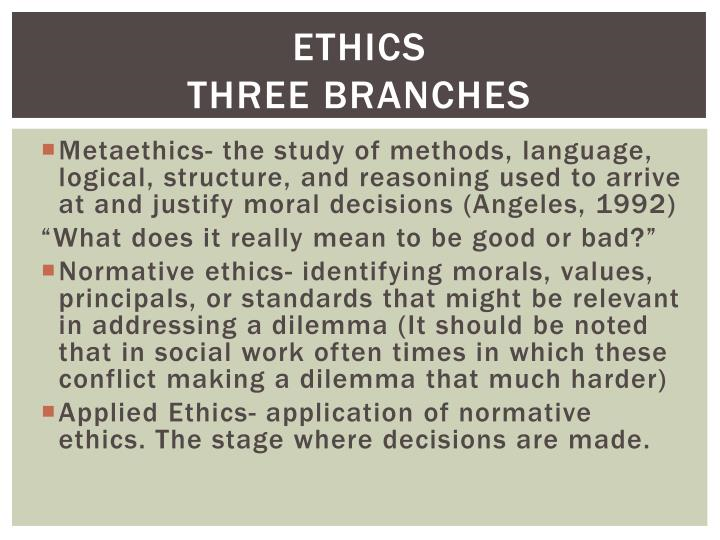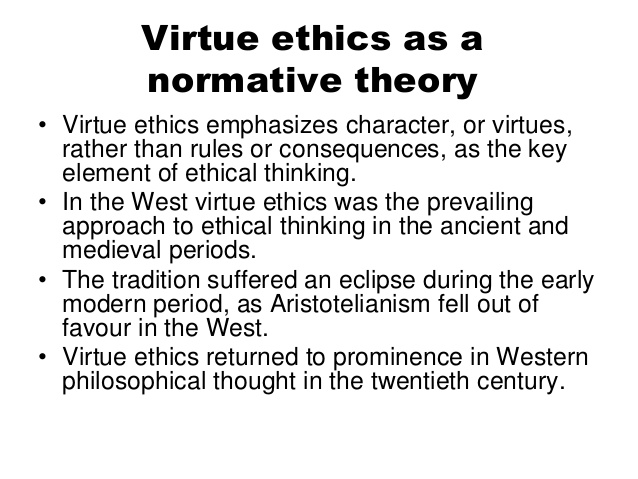The following General Ethics Information provides the frame work for the SDCA Code of Ethics.


Virtue/Character Ethics is a subset of Normative Ethics
Aristotle
A great deal of our western culture is based on the virtue/character ethics ideal.
- It says, everything has a purpose and function.
It asks, what is the moral decision based on? What kind of person (character) should I be become?
It says, cultivate virtues/character traits or habits. In short, morality is a learned behavior.
It also says, virtues are learned by…
– Imitation. At first, as a young child. For example, a child learns by imitating or we imitate others (i.e. teachers, leaders, etc.), and gradually we…
– Internalize the best way to act, not because we have to do it or because someone says you have to do it, but because it’s the right thing to do. Then you…
– Practice, and it becomes habitual. A virtue (love, care, give, bear, just) is a habitual way of acting consistent with your purposes or the purpose of the nature of the thing you’re involved with.
How would you define virtuous? Virtue is the “mean” between excess and defect (Golden Mean or Golden Rule). Only voluntary actions are praiseworthy or blameworthy. We can define voluntary action as any action that originates in the agent and not in some outside force like a push or a stumble. There are borderline cases, however, as when someone is compelled to behave dishonorably under severe threat. Voluntary action is characterized by rational deliberation and choice, where the agent determines the best course of action by reasoning how best to achieve desirable ends.
The examples below come straight from Aristotle. For example, in the social setting, in a dangerous situation the excess way to act would be rash, the virtuous (means) way to act is with courage, and the defect would be to act with cowardice.
| Social Settings | Excess | Mean | Defect |
|---|---|---|---|
| Danger | Rash | Courage | Cowardice |
| Self-expression | Boast | Truthful | Meek |
| Social Relations | Obsequious (too friendly) | Friendly | Rude |
| Money/Spend | Prodigal | Thrifty | Tight |
Guidelines for Virtuous Behavior
Develops character, not just obey laws (this is a strength). You develop an image of what the ideal person is.
Emphasizes human interdependence. The wise teach the young. It says, don’t be so foolish thinking that you can figure out things on your own, listen to your elders.
Emphasizes gradual maturity. We don’t all the sudden become the moral person in life, there’s no magic wand.
Holds up virtues as ideals, as well as determinants of morality. There’s a loophole, over a period of time, the definition of virtue varies in cultures, as in periods of time.
In Greek times, the definition of virtue is very “macho.” In Plato, the highest instance in life is being a warrior (physical fitness). In the middle ages in the Western world, the definition changes to Christian (following the example of Jesus). So who’s a good person today? A good person today is a virtuous person, a person who functions.
![Immanuel Kant [Duty Ethics]](https://usercontent2.hubstatic.com/5446425_f496.jpg)
Duty Ethics
Duty Ethics (Immanuel Kant)
- Immanuel Kant did not like a morality based on laws, church laws. He said you can’t depend on laws, because laws sometimes are made by capricious people. He said there’s one thing that human beings have in common, and that is the ability to reason. Pure reasoning is the source of morality.
- He says here that morality has its roots/foundation in the condition of goodwill among people. In other words, the most basic thing about people is, they want to live in a good society, have relationships with other people.
- He said we have an obligation to do the right thing. Duty Ethics say we have a duty to achieve good. How do you figure out what is good? He says your reasoning can figure that out.
- People/actions are moral when they achieve the good/goodwill. He also says, to be moral, an action must be voluntary. You don’t get credit for an action, because…
– you have to do it
– you have a nice personality
– you are very pleasant
– punishment is feared
– of impulse
A moral action has to be done voluntarily. Morality is a conscious action according to his way of thinking.
- He says, morality is discovered by pure reason not by law or consequences.
Duty Ethics is a very famous system. Here are the rules for Duty Ethics:
- First, act only according to that maxim (rule), which can be a universal law for all people in all circumstances. In other words, using your pure reasoning. You can come up with what is the moral way to behave. It says, it makes sense to be truthful. This maxim is universal, and applies to everybody in all circumstances, there is no exception to the rule, as in the example a lie is a lie, is a lie (Categorical Imperative).
- Second, how do you check to make sure that you have come up with a good rule? This calls for the principle of Reversibility. It says, the maxim (rule) is right if one would want to be treated that way themselves. It’s called the Golden Rule, “Do unto others, as you would have others done unto you.”
- Third, do not use others as a (mere) means to one’s end. This is called Practical Imperative. It says, find a rule that is the virtuous way of acting, the moral way of acting. Check it out, and whatever you do virtuous, do it not for your own selfish reasons (because it violates moral reasoning and behavior), but because it’s the moral thing to do. To use each other is immoral.
Duty Ethics Guidelines:
- Like other systems, it places responsibility directly on the individual.
- Insists on rules that are logical and applicable to all. It tries to be consistent.
- He does not indicate which rules you should follow. What should I do? Figure it out for yourself, it’s up to you.
- Too rigid? Would it be right to lie to your spouse? Yes. A qualified rule is something that is okay or not okay, except under certain circumstances. For example, is it wrong to take another person’s life? What about in self-defense, or in war, an abortion? This doesn’t allow for the situation or other consequences, and it’s highly irrational.
- In the principle of reversibility, if I were going to be treated that way, doesn’t it imply the consequences of an action?
- A qualified rule, as in “…except in the case of…” can be as valid as an unconditional statement).
Applied Ethics
Applied ethics is a branch of ethics devoted to the treatment of moral problems, practices, and policies in personal life, professions, technology, and government. In contrast to traditional ethical theory—concerned with purely theoretical problems such as, for example, the development of a general criterion of rightness—applied ethics takes its point of departure in practical normative challenges.
